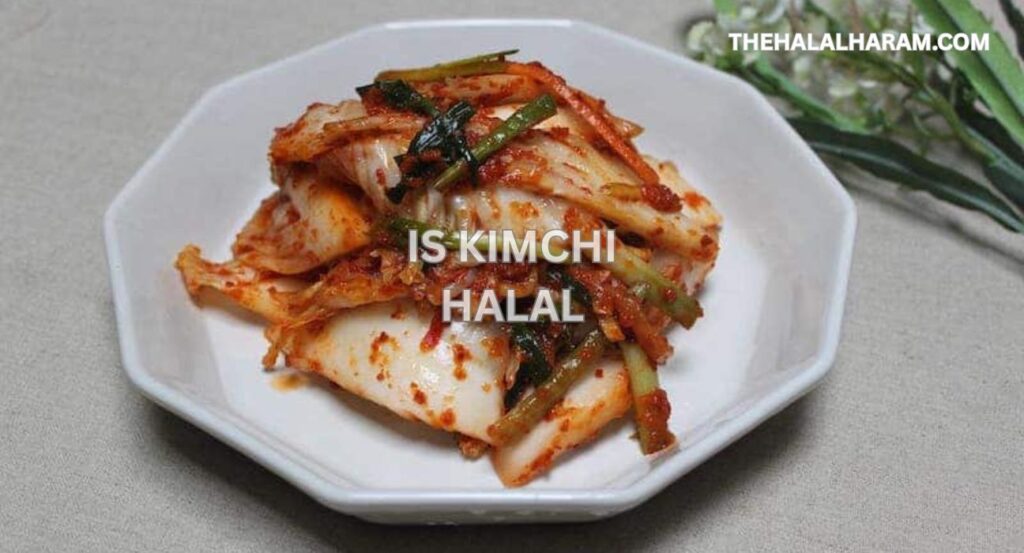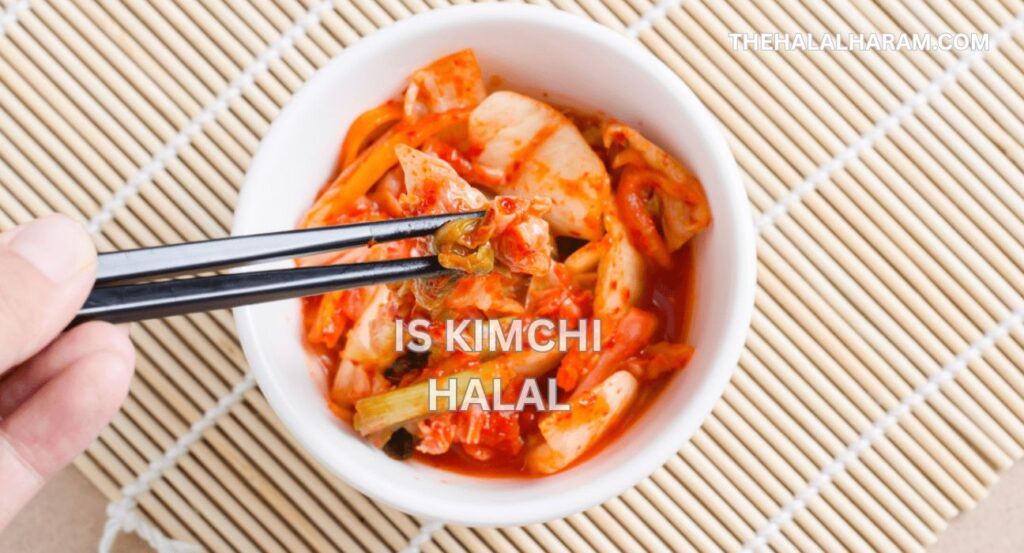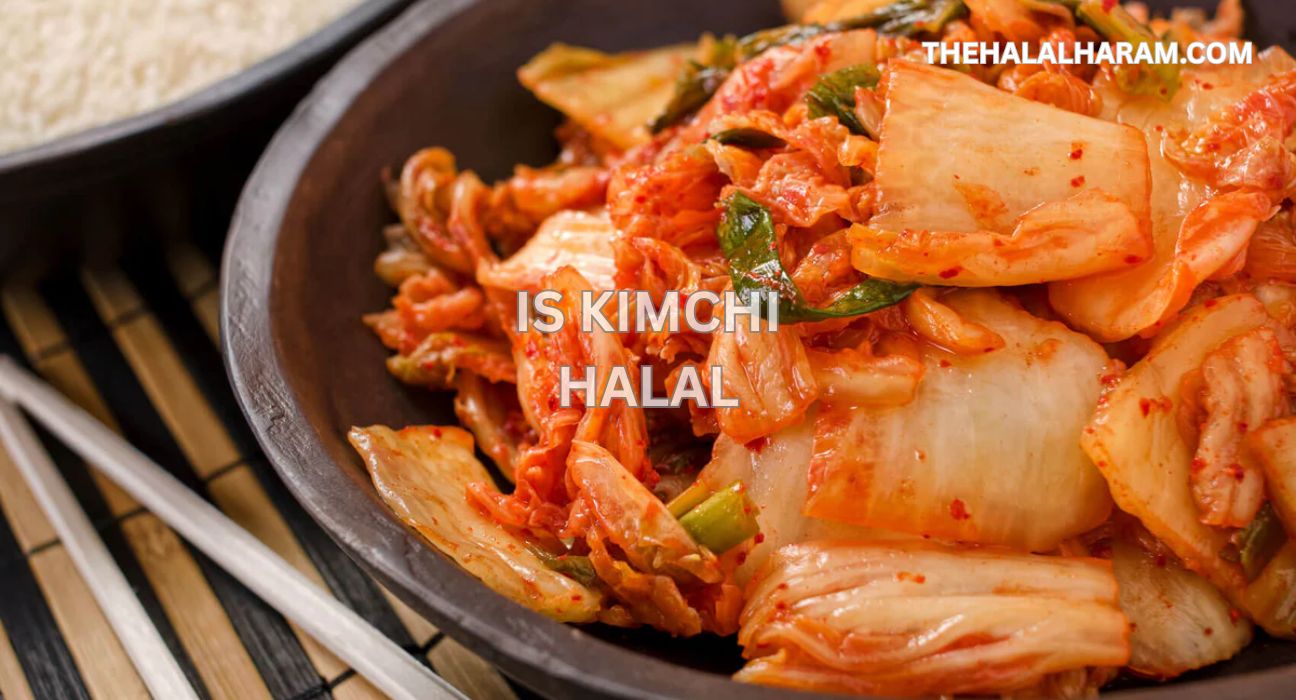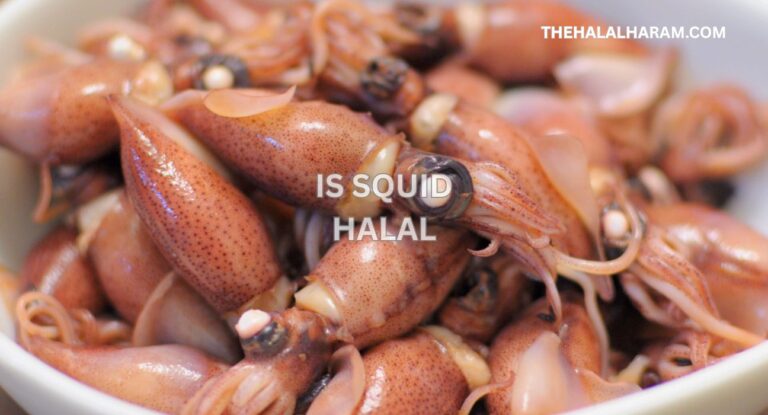Is Kimchi Halal? A Complete 2025 Guide for Muslim Consumers
Introduction
Kimchi is a spicy-sour side dish that most people first meet on Korean barbecue tables. Muslims everywhere love its punchy flavor, but they still ask: is kimchi halal? The short answer is: it all hangs on the recipe. In this guide, we sort through the dos, the don’ts, and the best ways for you to enjoy kimchi without doubts.
Read More: Is Ben and Jerrys Ice Cream Halal
What Is Kimchi?
Kimchi generally means napa cabbage that has been soaked in a bright red seasoning paste, but in Korea the word covers a huge range of pickled treats. The classic version stays vegetarian, leaning on garlic, ginger, salt, and Korean chili powder to build heat. That mix is naturally halal, yet many shops and home cooks jazz things up with fish sauce, shrimp paste, or even small doses of beer, and those extras are where trouble can sneak in.
Traditional Ingredients in Kimchi
The base list-napa cabbage, daikon radish, garlic, ginger, salt, and gochugaru-chili flakes-is usually halal because none of them come from animals. The difficulty crops up when fermented anchovy sauce, salted shrimp, or cooking wine slips into the paste. Any of those would make the batch haram, so checking the label or asking the cook is key before you dive in.
How Kimchi Is Prepared and Fermented
After the veggies are cut and salted, they sit for a few hours to draw out moisture and soften slightly. Cooks then smear on the spicy paste, pack everything into jars, and leave it on the counter for a few days, letting wild bacteria work their magic. That slow process gives kimchi its tangy kick and, yes, can create tiny amounts of alcohol, so people sometimes stumble over that fact too.
Is Kimchi Halal in General?
Because hundreds of kimchi styles exist, saying kimchi is halal or haram across the board would be a stretch. Some brands use only plant ingredients, while others dip a toe into seafood or alcohol. When shopping, look for bottles marked halal, scan the ingredient list for fish sauces, or simply stick to recipes you control at home.
Alcohol in the Fermentation Process
Whenever vegetables and spices ferment, tiny amounts of alcohol can form without anyone pouring in a bottle. Scholars disagree on whether this is a problem, but many say even small traces can be haram if they might intoxicate or escape heat.
What Makes Kimchi Haram?
Common Non-Halal Additives in Kimchi
Fish sauce, shrimp paste, and anchovy sauce sit at the top of the list-because none of them become halal unless the animal is slaughtered the halal way. Many times the creatures used were not treated properly or are simply haram by nature.
Fermented Alcohol Content in Kimchi
How much alcohol actually appears depends on time and room warmth. For most batches the level stays so low that you probably could not taste it at all. Still, because no label spells out the number, some Muslims skip the dish just to play it safe.

Are There Halal-Certified Kimchi Brands?
Popular Halal Kimchi Brands
Today several companies make halal-certified kimchi just for worried eaters. These recipes leave out seafood and any ingredient that can turn sweet cabbage into booze. Seek out Choi s Kimchi, Wang Korea, or local names stocked in halal groceries.
How to Identify Halal-Certified Kimchi
Before the jar leaves the shelf, flip it over and search for the familiar halal stamp. Then read the ingredients line by line-a true halal item never sneaks in fish sauce, shrimp paste, or any other haram list item.
Can You Make Halal Kimchi at Home?
Easy Halal Kimchi Recipe
Absolutely! You can whip up halal kimchi right in your kitchen by leaving out any seafood ingredients. Swap fish sauce for soy sauce or miso, and use halal vinegar. That way, you still get the spicy, tangy bite you love without any worries.
Ingredients to Use and Avoid
Use: napa cabbage, daikon radish, garlic, ginger, halal vinegar, soy sauce, sugar, red pepper flakes, water.
Avoid: fish sauce, shrimp paste, anchovy extract, wine vinegar.
Making your kimchi at home lets you control the mix and makes sure it fits your diet.
What Do Islamic Scholars Say?
Fatwas on Fermentation and Trace Alcohol
Many scholars agree that fermented foods are okay as long as no extra alcohol is added on purpose and the amount left over cant get a person drunk. Because home fermentation is harder to monitor, some scholars suggest sticking to products that are certified halal.
Global Scholarly Opinions on Kimchi
Views also change from one country to another. In Malaysia and Indonesia, for example, many teachers accept the small trace of alcohol that homemade kimchi might produce. By contrast, stricter voices from Saudi Arabia or Pakistan usually warn people to play it safe and avoid anything that could sour their faith.
Is Store-Bought Kimchi in the UK Halal?
UK Supermarket Kimchi Options
The bad news is that most kimchi on UK shelves is not marked halal. Even big-name vegetarian jars often sneak in fish extracts. To protect your diet, always flip the jar and read every tiny line before you drop it in your basket.
How UK Muslims Can Make Safer Choices
When shopping, look for foods with a clear halal stamp, so you know they meet your needs. If you can’t find something, try cooking it at home with halal-certified ingredients. Small local halal butchers and Asian grocers usually stock plenty of safe options.
Does Vegan Kimchi Mean It’s Halal?
Differences Between Vegan and Halal
A product labelled vegan means it has no eggs, meat, or dairy, but that promise does not cover halal rules. Vegan kimchi can still sneak in wine vinegar or trace alcohol left over from fermenting.
Checking for Alcohol in Vegan Kimchi
Even the plant-based jars may use ingredients like wine vinegar. When in doubt, read the label again or message the brand, and if still unsure, pick a halal-certified product instead.
Is Kimchi Halal in Islam?
Kimchi is halal for Muslims only when none of the parts break Islamic food laws. Classic recipes often add fish sauce or contain alcohol during fermentation, which makes them questionable. Most scholars say fermented foods are fine as long as they don’t intoxicate or include extra alcohol. Because of that, Muslims should study the label or go for options marked halal.
Is Kimchi Halal for Shia Muslims?
Shia Muslims have their own set of halal rules, which can be a bit different from what many Sunni Muslims follow. When it comes to fermented foods like kimchi, Shia followers consider them okay as long as no alcohol has been deliberately added and any alcohol present is almost gone. Ingredients such as fish sauce or shrimp paste, however, must come from halal seafood. Because of this, anyone in the Shia community who wants to enjoy kimchi really needs to check every single item in the recipe.

Final Verdict: Is Kimchi Halal?
So, is kimchi halal or not? The short answer is that it all depends on what went into the jar and the way it was made. Older, traditional recipes usually contain things that are forbidden, yet you can find halal-certified brands or make it at home without those additives. For people who take halal rules seriously, reading the label or whipping up a batch in your own kitchen is the safest way to enjoy this crunchy side dish.
Read More: Are Doritos Halal in UK
Frequently Asked Questions
1. Is kimchi always halal by default?
Not really. Many classic recipes use fish sauce or shrimp paste, so it isn’t halal unless those ingredients are certified.
2. Can fermentation make kimchi haram?
Yes. During fermentation, a little alcohol can form, and if that stays in the final jar, it may make the dish haram for strict eaters.
3. Are there halal-certified kimchi products?
For sure. Several brands now sell halal-certified kimchi, made without any non-halal animals or alcohol-related ingredients.
4. What ingredients make kimchi haram?
The fish sauce, shrimp paste, anchovy extract, and wine vinegar in classic recipes kick the dish out of halal allowances.
5. Is vegan kimchi also halal?
Not automatically. Vegan labels can still sneak in alcohol or non-halal additives, so halal-certification is the safest bet.
6. Can Muslims eat store-bought kimchi in the UK?
They can if the jar carries a halal stamp. Most UK brands mix in forbidden flavoring, so a careful label check is a must.
7. How can I make halal kimchi at home?
Swap seafood sauces for soy, miso, or homemade broth, and leave out any alcohol. It’s flavorful and worry-free.
8. Is fermented food allowed in Islam?
Scholars split here: some allow tiny, non-intoxicating alcohol, others say stay clear, so personal study is key.
9. What halal brands offer kimchi?
Look for Wang Korea and Choi’s Kimchi in select stores—head to the ingredient list first to be sure.
10. Why isn’t all kimchi halal-certified?
Much kimchi relies on age-old recipes and tricky fermentation, so companies seldom seek halal tags unless they sell to Muslims.






